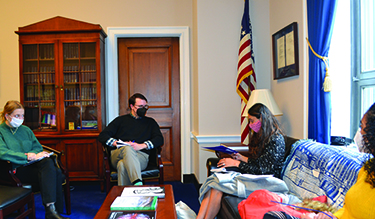With warmer temperatures, worsening air quality and extreme weather becoming more common, the impacts of climate change on human health are being felt in communities nationwide. In February, health advocates from across the U.S. came together in Washington, D.C., to learn how they can better communicate with policymakers on the issue and protect residents.
Hosted by APHA and the National Center for Healthy Housing, the Climate Communications Boot Camp helped advocates build their climate and health messaging skills and then put them into practice on Capitol Hill. Following a day of hands-on training, more than two dozen boot camp participants met face-to-face with congressional staffers to discuss environmental health issues in their home states, pitch solutions and ask for action at the federal level. 
Andrealis Martinez, a climate justice community organizer with the Fairmount Indigo CDC Collaborative, met with staff from four congressional offices, discussing local and regional environmental health issues in Massachusetts. The collaborative — which comprises three community development corporations — is working to protect the health and lives of residents along the Massachusetts Bay Transportation Authority’s Fairmount Commuter Rail Line.
Martinez told congressional staffers the collaborative supports electrifying the rail lines, as emissions from diesel-powered trains are contributing to health problems such as asthma for people who live nearby. While generating electricity contributes to climate change, electric trains emit less pollution along the railways.
Tulsi Modi, with the Planetary Health Alliance in Boston, accompanied Martinez on the Hill visits, using some of the tips from the prior day’s training to engage in conversations. She greeted staffers by mentioning the enjoyable — but abnormally warm — nearly-70-degree D.C. weather to call attention to the tangible effects of climate change.
“You don’t know how successful you will be in these meetings until you start doing it and understanding how it works,” Martinez told The Nation’s Health. “Something I learned yesterday that helped me improve was to think of this meeting as a regular conversation. (The congressional staff) are there to listen to you and the community’s issues, so you have to make that a priority for them.”
Before they set out for Capitol Hill, the advocates gathered in small groups to practice the skills they learned, including roleplaying discussions with policymakers and creating pitches for reporters and social media. They received insights from experts who have spent time working with policymakers and serving as leaders themselves.
“The (policymaking) process is purposefully obscure, so once I left the Hill, I’ve been trying to lift the veil,” Elisabeth Coats, MSW, who worked as a U.S. Senate staffer for more than three years and is now director of policy and advocacy at the National NeighborWorks Association, told participants.
Edward Maibach, MPH, PhD, a professor and director of the George Mason University Center for Climate Change Communication, said that to be effective, pitches should be consistent, clear and contain an element of human interest.
“Numbers numb, but stories sell,” Maibach said. “Statistics are useful, but there needs to be people or something else we care about in the story to get people interested.”
Janelle Wright, who attended the Climate Communications Boot Camp on behalf of the West Atlanta Watershed Alliance in Georgia, said she learned new skills she could bring back to her organization and community.
“A lot of this information around language and communicating, particularly to folks who create policy, is really beneficial to how we navigate relationships and conversations with local policymakers and other stakeholders,” she told The Nation’s Health. “These climate issues are connected not just to the hyper-local, but the region.”
For more information on the connection between human health and climate change, as well as tools for communicating about it, visit the APHA website.
Caption: Tulsi Modi, third from left, with the Planetary Health Alliance in Boston, spoke with congressional staffers about climate policy on Capitol Hill at the Climate Communications Boot Camp in February. (Photo by Mary Stortstrom)